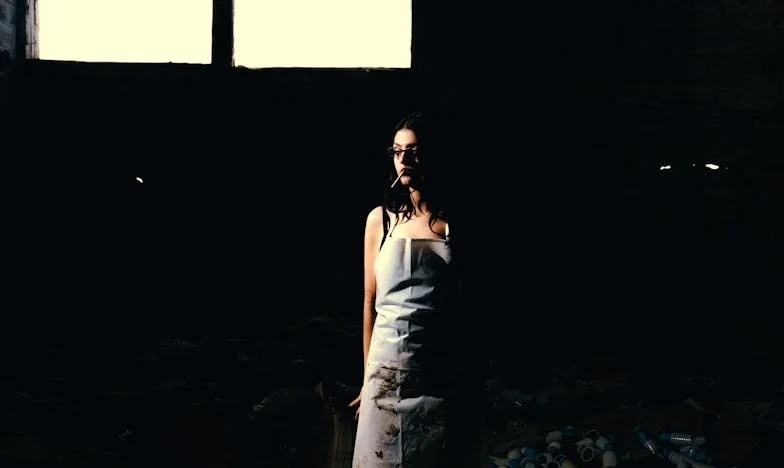The Right to Be Tired: A Night in Suburbia
The garage door groaned as I pulled in, headlights flashing against the clutter of bikes and boxes. My hands shook on the steering wheel, not from fear—just pure exhaustion. I sat in the car for a minute, staring at the dashboard clock. 10:47 p.m. Another late night, another day lost.
Sarah’s text buzzed on my phone: “Don’t forget we have to talk.”
I sighed. I wanted nothing more than to disappear into the driver’s seat, let the plastic and faux leather swallow me whole. But I killed the engine, grabbed my battered briefcase, and trudged inside. The house was quiet, save for the low hum of the fridge and the distant sound of cartoons drifting from my daughter’s room.
I didn’t say a word as I slipped off my shoes in the entryway. My coat fell heavy on the hook. The kitchen light was on, and Sarah sat at the table, arms folded, hair pulled back in a messy bun. A plate of chicken marsala, her specialty, waited for me, steam curling in the air. Next to it sat a bowl of Caesar salad, croutons already soggy.
“You’re late again,” she said, voice flat. “We waited.”
I ran a hand over my face. “I’m sorry, Sarah. The Anderson project blew up. I couldn’t just walk out.”
“You always have an excuse, Mark.” She pushed the plate closer, but I could see her eyes—red-rimmed, tired. Not angry, not really. Just worn down, like me.
I sat, fork poised over the chicken. “I’m doing my best.”
She looked at me then, really looked, and for a moment I saw the girl I’d married, the one who laughed at my dumb jokes and danced barefoot in the living room. But that light was gone, replaced by something brittle.
“Your best isn’t good enough anymore. Not for me. Not for Emily.”
My chest tightened. I stared at the ceiling, searching for the right words, but all that came out was, “I’m tired, Sarah. I’m so damn tired.”
She didn’t flinch. “I know. Me too.”
A silence stretched between us, filled with everything we never said. The mortgage. The bills. Emily’s therapy appointments. My boss who threatened layoffs every week. Her mother’s cancer treatments. The way we’d stopped touching, stopped laughing, stopped being us.
I tried to eat, but the food tasted like nothing. Sarah got up, rinsed her mug, and stared out the window above the sink. Outside, the neighbor’s Christmas lights blinked, garish in the April dark.
“I miss you, Mark,” she whispered. “I miss us.”
I wanted to tell her I missed us too, but the words stuck. “I just… I don’t know how to do this anymore. I don’t know how to be everything.”
She turned, tears brimming. “No one asked you to be everything. We just need you to be here.”
I looked at the clock. 11:03. Emily would be asleep, clutching her stuffed penguin. I wondered what she dreamed about—if she noticed the tension, the way her parents moved around each other like strangers in their own home.
Sarah’s phone buzzed. She ignored it. I stood, my legs stiff, and walked to the living room. The TV flickered, casting blue light over the toys and laundry. I remembered when this room was empty, before Emily, before the promotions and the late nights. Before the weight of everything made me forget how to breathe.
Sarah followed, arms crossed. “We can’t keep going like this.”
I nodded, not trusting myself to speak.
She sat beside me, close but not touching. “Do you ever wish you could just… run away?”
I laughed, bitter. “Every day. But then I remember I’d just be tired somewhere else.”
She smiled, sad. “Maybe that’s the problem. We’re so busy surviving, we forgot how to live.”
I stared at my hands, calloused from work, and realized I didn’t remember the last time I’d held hers. I reached over, hesitantly. She let me take her hand, her grip cold but steady.
“We’re allowed to be tired, Mark. But we can’t let it be all we are.”
I squeezed her hand, and for the first time in months, I felt something like hope. Maybe tomorrow I’d get home earlier. Maybe we’d talk, really talk. Maybe Emily would wake to laughter instead of silence.
Or maybe not. Maybe we’d just keep drifting, two ghosts haunting a house built on dreams we could barely remember.
I don’t know how people do it—how they keep loving through the exhaustion, the fear, the endless grind. But maybe the real question isn’t whether we have the right to be tired. Maybe it’s whether we have the courage to keep going anyway.
Tell me—have you ever felt this way? What keeps you going when it feels like everything is just too much?
